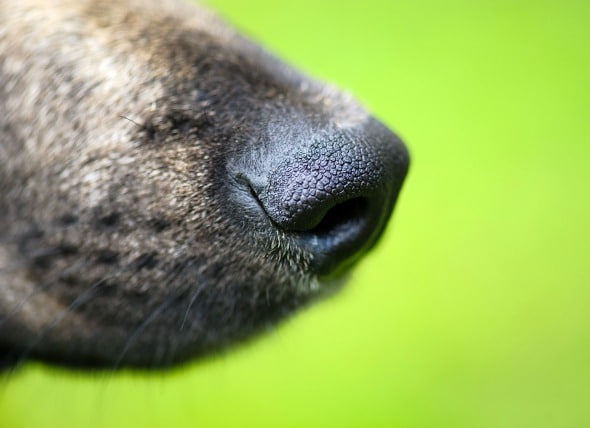
Image source: https://www.petmd.com/sites/default/files/nose-skin-diseases-dogs.jpg
Degenerative Myelopathy typically occurs in mature dogs. It usually shows itself with rear leg weakness. The weakness may be in both legs or one side may be affected more than the other. DM features difficulty moving rather than the inability to control movement. This is a progressive condition that starts in the rear legs and moves forward, finally reaching the brain stem. There is usually no pain. Bladder and bowel function usually remain intact. The dog may drag his feet. DM is a genetic disease.
Intervertebral Disk Disease (IVDD) is a degenerative disease which may have a genetic-related predisposition to premature degeneration of the spinal elements which can lead to damage and injury. The spinal disk becomes less flexible and sooner or later breaks down. This compresses and inflames the spinal cord and its membranes and nerve roots.
Wobblers Syndrome can occur in multiple forms but all of them feature a misalignment of the cervical vertebrae (the neck vertebrae). The symptoms include an unsteady or wobbly gait. The two typical clinical forms of Wobblers are found in middle-aged to elderly dogs and in very young dogs. Dobermans are inclined to get the form for older dogs; Great Danes are likely to get the form for juveniles.
Lumbosacral Disease describes disk problems with the lumbosacral space along the spine. It can include misalignment or disk degeneration.
Spondylosis Deformans usually occurs in middle-aged or elderly dogs. It is usually an age-related degenerative condition that features vertebral instability and damage. It may be painful and cause problems in mobility.
Neoplasia refers to tumors that can develop anywhere along the spine. Depending on their size and position the tumors can have different affects on a dog. Some of them can be very serious. Osteosarcoma, fibrosarcoma, chondrosarcoma and hemangiosarcoma are the most common.
If your dog has trouble walking, exhibits pain when he walks, when shifting position, trying to rise or lie down, or seems to have limited mobility, it's a good idea to see your veterinarian. He may be able to diagnose a spinal problem before it becomes worse. Many therapies can help your dog and there are some holistic treatments that have proven successful. Acupuncture is said to help some dogs while joint supplements have helped other dogs. Some people have tried Chinese herbs with success. Even using an holistic diet has been beneficial to some owners and their dogs. Surgery is not the solution in every case. Even reducing your dog's weight can help in many cases.
